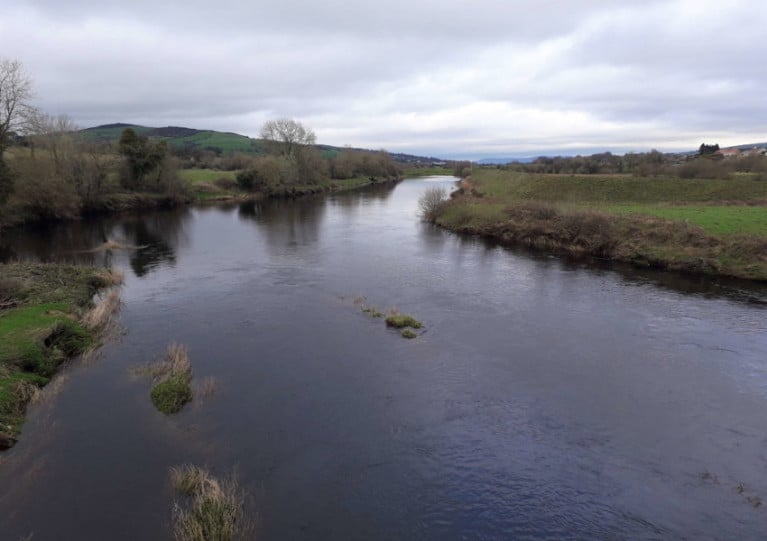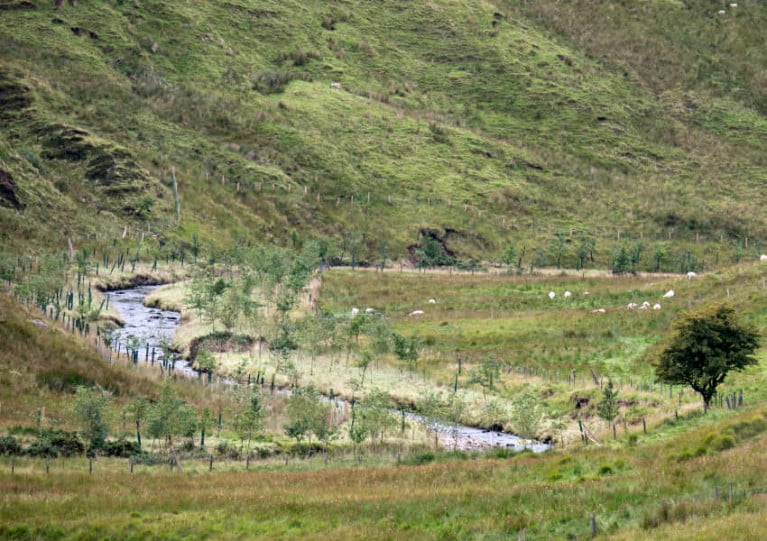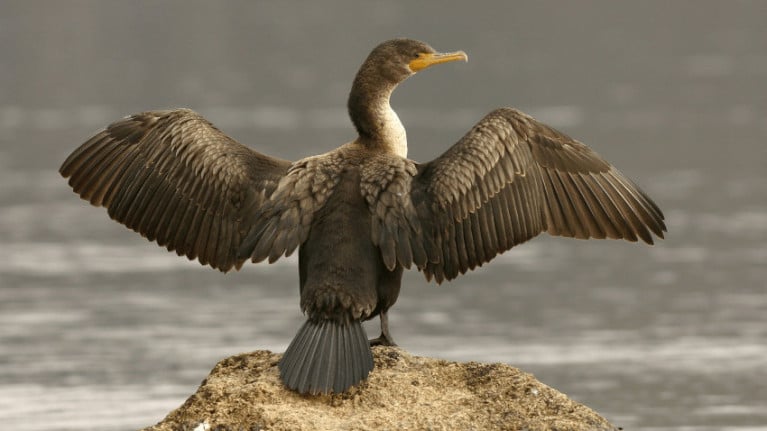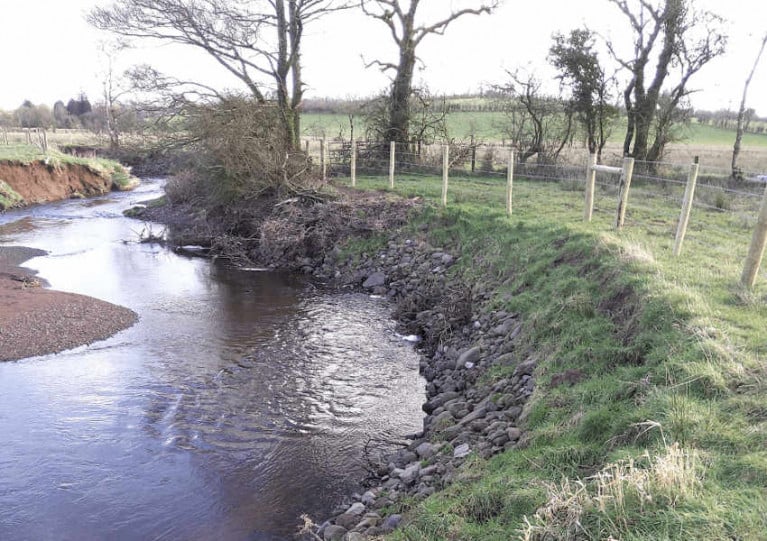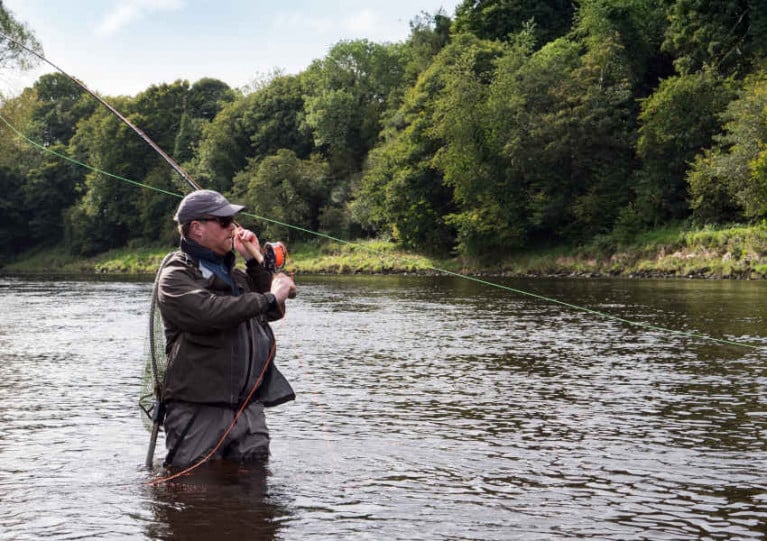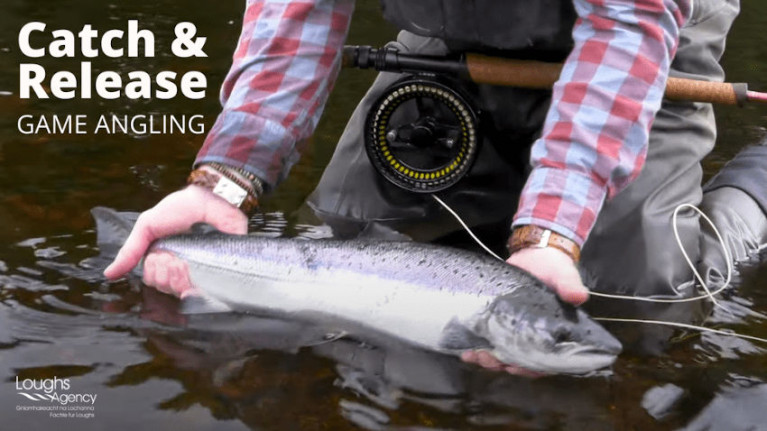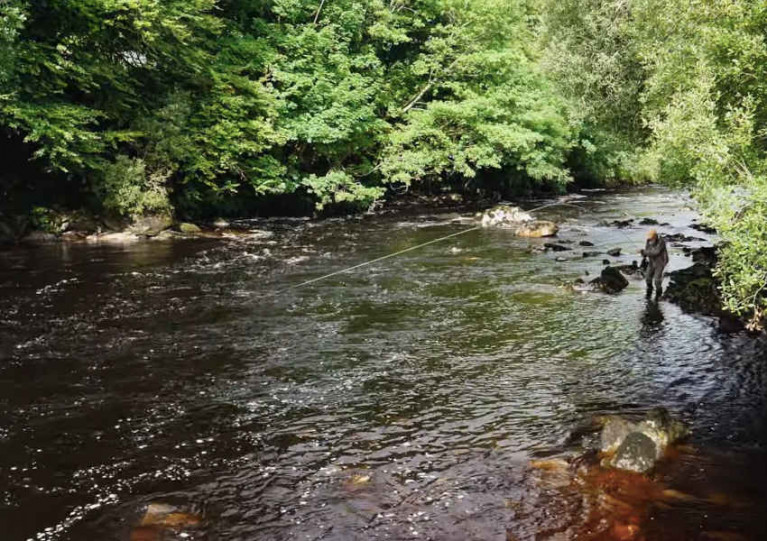Displaying items by tag: Loughs Agency
TV’s Barra Learns Knowledge of Salmon From the Best at Lough Agency Schools Conference
TV weather presenter Barra Best learned about the iconic Atlantic salmon from school pupils at the recent virtual Salmon Ambassador conference hosted by the Loughs Agency.
The conference was the culmination of a five-month primary school education programme that encouraged pupils to learn about their local river system.
It included a range of activities and topics such as salmon life cycles, migration, conservation, preservation, restoration and the role of the Loughs Agency.
School pupils also received regular video updates of live salmonids and watched as the eggs developed, hatched and matured to the fry and parr stage of their life cycle.
At the conference, which Barra Best compered, nearly 200 pupils gathered virtually and presented animations, videos, posters and works of art to their fellow Salmon Ambassadors, with each class focusing on a particular life stage.
Pupils highlighted the habitat in which the fish live, the food they eat, the natural threats they face and the impact of human activities and waste on their health and survival.
Loughs Agency CEO Sharon McMahon said: “The children who participated in Salmon Ambassadors are the next generation of environmentalists, anglers, fishery officers, teachers, scientists and caretakers for the natural world.
“I hope that Salmon Ambassadors has inspired them to care passionately about our planet and instilled in them the importance of living in balance with nature.”
The Loughs Agency initiated Salmon Ambassadors as part of the International Year of the Salmon to help connect young people to the incredible fish that inhabits the Foyle and Carlingford river catchments. For more information see the Loughs Agency website HERE.
The Loughs Agency has issued advice for any anglers in the Foyle and Carlingford catchments who have made unusual catches in recent weeks.
Those who suspect they have caught an escaped farmed Atlantic salmon, escaped farmed Rainbow trout, escaped farmed brown trout, non-native pink salmon or fish displaying external or internal signs of disease are directed to follow the advice below:
- Please report to DAERA Inland Fisheries at [email protected] or the Loughs Agency at [email protected]
- If possible take a picture prior to release and attach this to any report.
- Do not dispatch fish unless in line with current fisheries regulations and bag limits.
DAERA Inland Fisheries and the Loughs Agency will monitor reports and develop further advice if required.
Loughs Agency Looks Forward to 2022 Foyle Maritime Festival & Return of Clipper Race Fleet
The Loughs Agency says it welcomes the news that Derry City and Strabane District Council’s Business and Culture Committee have endorsed the proposal to host the Clipper Round the World Yacht Race in 2022.
Northern Ireland was previously scheduled to host the Clipper fleet in Derry last summer but those plans were scuppered with the postponement of the race amid the COVID-19 pandemic.
Sharon McMahon, Loughs Agency chief executive, said: “As an organisation that cares deeply about the Foyle and its surrounding areas, Loughs Agency is delighted to welcome the Foyle Maritime Festival and Clipper Race back to our doorsteps in 2022.
”The number of local people getting involved in water-based activities is steadily on the rise, and this festival gives us the opportunity to showcase our picturesque rivers and loughs to an international audience, thus aiding in the development of marine tourism.
“We look forward to playing a role in supporting the festival and using the opportunity to highlight the social, economic and environmental benefits of the Foyle and our rivers in general.”
Speaking at a recent Business and Culture Meeting of Derry City and Strabane District Council, head of culture Aeidin McCarter said: “If you look back to 2018, the last Foyle Maritime Festival attracted almost 211,000 attendees, achieving over 19,000 bed nights and an estimated economic impact of at least £2 million for the local economy.
”That gives an idea of the significance of the Festival and the Clipper Race in terms of its capacity to draw visitors from all over the world as well as international media coverage of all the North West has to offer.
“Needless to say, we are delighted to resume our partnership with Clipper Ventures, and we hope that, circumstances permitting, we will be able to adapt and deliver on the plans which came to such an abrupt halt last year.”
The Loughs Agency has announced that angling permits for its waters on the River Finn and River Foyle, including the Greenbraes, are now available to purchase online.
Online permits will make angling in these rivers even more accessible, particularly during the current COVID-19 government restrictions when many tackle shops are closed.
Loughs Agency permits provide access to some of the best quality fishing locations in the Foyle system, which is famous for its salmon and trout angling.
The River Foyle is a large tidal river that begins its seaward journey near Strabane in Co Tyrone and Lifford in Co Donegal at the confluence of the River Mourne and River Finn, spilling into Lough Foyle at Culmore Point in Co Derry.
Along its length are several fishing hotspots, including Mary’s Pool, the Gribben, Corkan Island and the Backwater, where anglers can cast a line for salmon, brown trout and sea trout.
The Finn is a well-known spate river for spring fish, but it also maintains a good run of salmon throughout the season. Sea trout fishing is best from July to mid-August.
For the 2021 season, the regulations for the River Foyle and Finn require total catch and release for all salmon caught, and anglers must use single barbless hooks.
For more information on fishing in the Foyle catchment, visit the angling section of Loughs Agency's website. To purchase a permit, visit the Loughs Agency's elicence website. Prices are as follows:
- River Finn permit: £20/€24 for adults £10/€12 for juveniles
- River Foyle permit: £20/€24 for adults £10/€12 for juveniles
- Greenbraes morning permit: £15/€17 8am to 3pm
- Greenbraes afternoon permit: £18/€20.50 4pm to midnight
Loughs Agency Invests £80k in River Roe Enhancement Projects
Over £80,000 has been invested in habitat enhancement projects in the River Roe catchment area in Co Derry during the past two years, the Loughs Agency says.
More than 20 sites within the Roe catchment were prioritised by the agency as a result of an assessment process conducted with habitat surveys and local angling club engagement.
Investment since 2019 included installing 6,500m of riparian fencing along the Bovevagh, Castle, Lynn, Owenbeg and Woodburn rivers and adjacent to the main River Roe itself.
Native trees planted previously to increase tree cover in the Roe’s upper reaches have been pruned to encourage growth, and around 4,000 tree guards were removed.
Instream works were also completed in the headwaters to ensure suitable spawning habitat for salmonids.
This is regarded as an area of special scientific interest (ASSI) because of the river’s physical features and its associated riverine flora and fauna. It is noted in particular for the population of Atlantic salmon, which is of international importance.
Riparian fencing, tree planting and associated works will improve water quality with increased bank stability and reduced erosion risk, the Loughs Agency says.
‘At a time when our rivers generally are under threat, this work will hopefully prove its worth in the years ahead and help sustain this valuable resource’
Biodiversity support, protection of invertebrates and indigenous fish populations in the River Roe and its tributaries are all key features of ongoing river restoration in the catchment area, it adds.
Roly Wysner, fishery inspector at the Loughs Agency, said: “The positive engagement between Loughs Agency and landowners cannot be understated.
“We worked with landowners who were very willing to participate and understood the rationale for the installations. They appreciated how it would feed into achieving sustainable management of both the riparian and aquatic habitats.”
Local club Roe Angling Ltd also welcomed the projects. A spokesperson said: “At a time when our rivers generally are under threat from a number of sources, this work by Loughs Agency will hopefully prove its worth in the years ahead and help sustain this valuable resource.
“The success of this programme is also indicative of the positive relationship that exists between Loughs Agency and landowners.”
The Loughs Agency’s Habitat Improvement Strategy outlines works associated with conserving, protecting, and improving the abundance and distribution of wild salmon and trout in Foyle and Carlingford’s freshwater catchments.
For more information on Loughs Agency’s habitat enhancement work or to read the full case study for the Roe catchment, visit the habitat section of the Loughs Agency website.
Licences Required to Deal with Cormorants Predating on Salmon Smolts in Northern Ireland, Loughs Agency Advises
The Loughs Agency says it shares its stakeholders’ concerns about the impact of cormorants predating on juvenile salmon during the annual smolt migration.
Unlike other salmon predators, cormorants are a protected species under Article 4 of the Wildlife (Northern Ireland) Order 1985.
Given the legal protection of this marine wildlife species, the management and population surveys are the responsibility of the Wildlife Section of the Biodiversity and Conservation Science Unit, Northern Ireland Environment Agency (NIEA) and their counterparts in the National Parks and Wildlife Service (NPWS).
Angling clubs and fishery managers in Northern Ireland should be aware of the process to apply for the appropriate licence to assist in managing these birds and other actions, including scaring the birds to move them on, after agreement with wildlife officers from NIEA.
The NIEA advises that under Article 18 of the Wildlife (Northern Ireland) Order 1985, an application can only be legally processed if it can be shown that:
- There is no other satisfactory solution, and;
- The licence is issued to prevent serious damage to a fishery.
The Loughs Agency has highlighted £12,000 of habitat enhancements works on the Drumragh River catchment in Co Tyrone throughout 2020.
The Drumragh catchment comprises a series of branching river systems such as the Seskinore River, Routing Burn, Quiggery River and Owenreagh River.
Through habitat surveys and angling club engagement, the Loughs Agency assessed that the Aghlisk River, a tributary of the Owenreagh, had severe erosion issues. Entire banks had collapsed into the river, causing siltation of spawning areas.
The erosion was also being acerbated by livestock trampling the riverbank due to a lack of riparian fencing.
The agency worked in partnership with local landowners to install 310 metres of fencing to prevent livestock from accessing the river bank and to create a natural buffer. Another 150m of bank revetment work was also completed to combat erosion.
On the Quiggery River, 30 metres of collapsed bank was reinstated using root wads and fencing reinstalled following a flood which caused a large area of bank to slip into the river.
Seamus Cullinan, fishery inspector at the Loughs Agency, said: “These works will boost the rivers’ ecological status, ensuring salmon and trout requirements for the various stages in their lifecycle are met without hindering drainage.
“The riparian fencing and revetment works will improve water quality, increase bank stability, reduce erosion risk, support biodiversity and protect the watercourses’ indigenous fish populations.”
The Loughs Agency website has more on its habitat enhancements works, including a full case study for the Drumragh catchment.
While some anglers enjoyed success on the rivers within Foyle and Carlingford in 2020, the Loughs Agency says it continues to take a precautionary approach in line with national and international trends.
The State of the Salmon Report published by the international lead on salmon management, the North Atlantic Salmon Conservation Organization (NASCO), highlights the worrying and continuous decline in the populations of the Atlantic salmon.
NASCO states: “It now takes about double the amount of eggs to produce one adult (compared to 1990s) that will return to that same river to spawn — an indication of the multiple pressures facing the species throughout its complex life cycle.”
This decline continues to be reflected locally, the Loughs Agency warns, with rivers such as the Finn in Co Donegal failing to reach their conservation targets in 2020 and therefore will continue to operate on a catch and release basis for the 2021 season.
Now the agency is calling on anglers to take steps to ensure sustainability of the fisheries of Foyle and Carlingford. Anglers are encouraged to:
- Update their catch return and fishing effort regularly throughout the season on the eLicence website. This data is used to help Loughs Agency manage the fishery using real-time data.
- Keep the Loughs Agency’s 24hr Response Line telephone number +(0) 44 2871 342100 as a contact on their phone and report any concerns directly and promptly. The Loughs Agency relies on reports of illegal fishing and pollution from the public.
- Practice catch and release. Many anglers already do this, with around 45% of anglers not taking carcass tags when they purchase their licence.
- Implement biosecurity measures to prevent the spread of invasive species.
- For the 2021 season, the Loughs Agency is issuing a maximum of one blue tag for the period 1 March to 31 May and/or a maximum two black tags for the period 1 June to 31 October, depending on the type of licence purchased. Tackle shops have been instructed not to issue more than these maximum quantities for the 2021 season.
The rivers Film and Foyle opened this past Monday 1 March, signalling the start of the salmon, sea trout and wild brown trout angling season. However, game, coarse and sea angling is already available in both catchments.
For still water game anglers, Binevenagh Lake opened on 1 February. The lake lies on a basalt plateau that towers over Lough Foyle and its flanking lowlands below with the famed hills of Donegal beyond.
The 3.2 hectare lake is regularly stocked with rainbow trout by DAERA Inland Fisheries and successful flies include Bibio and Buzzer patterns.
Fly fishing, spinning and worm fishing are permitted and the fishery has a daily bag limit of four trout per rod. A Loughs Agency game rod licence and a DAERA game angling permit are required to fish this water.
Some private fisheries are also operating and offer fishing for rainbow trout including Ballyheather, Altmore, Birchwood, Cashel, Termon, Oaks, Glenowen, and Duncrun Fishery in the Foyle area. In the Carlingford area, Donaghaguy Reservoir is open for trout fishing. A Loughs Agency game licence and a permit from the relevant fishery are required to fish these waters.
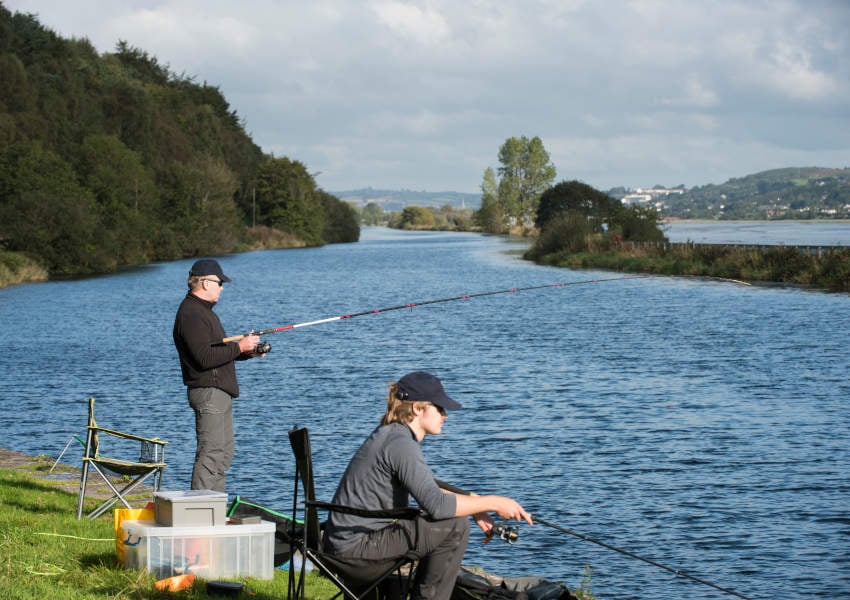 Coarse angling on the Newry Canal | Photo: Loughs Agency
Coarse angling on the Newry Canal | Photo: Loughs Agency
Coarse angling is permitted all year round, but the climate impacts on which species can be targeted. While tench, bream and rudd are active in warmer weather, roach and perch feed in all seasons and make good year round fishing for the coarse angler.
In the Foyle area, coarse fishing is currently available at Aghlisk Lough, Baronscourt Lakes, Enagh Lough, Longvale and Lough Muck near Omagh. In Carlingford, anglers can also fish for roach and perch at Bessbrook, Camlough, Derryleckagh, Drumlough, Greenan Lough, Mill Dam, Milltown Lough and in Newry Canal. A Loughs Agency coarse licence and permission from the relevant fishery owner is required to fish these lakes. In some cases a day ticket must be purchased.
The marine waters in Foyle and Carlingford offer fantastic sea angling with stunning landscapes and seascape backdrops. Flounder, bass, dogfish, dab, rockling, conger, pollock and ray are likely catches for the shore angler.
The Foyle area has over 90 miles of coastline of inlets, beaches, estuaries and rocky shores from which to cast from, while Carlingford offers almost 30 miles of coastline opportunities to fish. No licence is required for sea angling, but if fishing for salmon or sea trout a Loughs Agency game licence is required for the season.
Anglers are reminded to comply with the latest government advice and restrictions to stop the spread of COVID-19. For further information on season dates, licence and permit requirements in the Foyle and Carlingford areas, visit the Loughs Agency website’s angling section HERE.
Loughs Agency Renews Appeal for Anglers to ‘Catch & Release’
The Loughs Agency has launched a new campaign appealing for angling enthusiasts to embrace the practice of catch and release to help sustain fish stocks in the Foyle and Carlingford areas.
The agency says it welcomes the growing trend of catch and release angling as a way of continuing to fish while limiting the impact on local stocks.
And it has produced a video guide to help anglers with their catch and release technique in order to increase the survival rate of salmon after release.
John McCartney, the agency’s director of conservation and protection, also explains the carcass tagging scheme which applies to salmon, brown trout and sea trout retained by recreational anglers, and highlighted the importance of returning any unused tags.
The Loughs Agency is aiming for a catch and release rate of over 80% for salmon and sea trout caught during the new season which is now partially underway.
It also wants to further reduce the number of anglers opting to take tags when purchasing a licence.
‘The agency welcomes this approach to angling and would encourage all anglers to practice this method’
McCartney says: “Last year, 45% of anglers purchasing a licence opted not to take tags and there is a growing trend of anglers implementing the practice of catch and release.
“The agency welcomes this approach to angling and would encourage all anglers to practice this method as a way of continuing to fish, whilst limiting the impact on local stocks.
“Numbered tags are allocated to anglers who request them when they purchase their licence. The angler then records their retained catch and the corresponding carcass tag number when updating their catch return during the fishing season, returning any unused tags to Loughs Agency when their licence expires.
“The catch return data from anglers is analysed throughout the season and used to make fishery management decisions to ensure the sustainability of species in Foyle and Carlingford.”
For the 2021 season, the Loughs Agency is issuing a maximum of one blue tag for the period from 1 March to 31 May and/or a maximum of two black tags for the period from 1 June to 31 October, depending on the type of licence purchased. Tackle shops have been instructed not to issue more than these maximum quantities for the 2021 season.
The above video guide to good practice for anglers with their catch and release technique includes the following pointers:
- Landing the fish quickly to avoid exhausting the fish.
- Use a soft knotless mesh net and keep the fish in the water at all times.
- If you must handle the fish, use wet hands and cradle it below the belly. Never put your fingers inside the gill covers or lift the fish by the tail.
- Use a single barbless hook to limit injury during removal. Remove the hook immediately, keeping the fish in the water.
- If the hook is caught deep in the fish, cut the line and release with hook still inside rather than trying to remove deep-caught hook.
- When releasing the fish, support it in the water using two hands, with the head pointing upstream to aid breathing.
The season has already started on some still-water fisheries, with fishing on the rivers beginning to open up from Monday 1 March.
For further information on season dates, licence and permit requirements in the Foyle and Carlingford areas, visit the angling section of the Loughs Agency website.
Foyle & Carlingford Anglers Urged to Make 2020 Catch Returns to Support Scientific Research
The Loughs Agency is reminding anglers in the Foyle and Carlingford areas to log and submit their angling effort, catches and releases for the 2020 season.
Rod licences for salmon and sea trout in Foyle and Carlingford come with a legal obligation to inform the Loughs Agency (via the eLicence web portal) of how many times the licence holder went fishing and got many fish they caught.
To date, the agency says less fewer than 10% of anglers have made their return for the 2020 season.
For the 2020 season, the Loughs Agency will be carrying out an in-depth study of catch returns and angling effort to determine fish runs in rivers, number of fish caught, weight of fish caught and/or released, and how much time anglers put into catching those fish.
As a result, anglers are encouraged to make their return and be as accurate as possible with locations, dates, weights, species, methods and time spent fishing.
The deadline for catch returns is Thursday 21 January 2021.



























